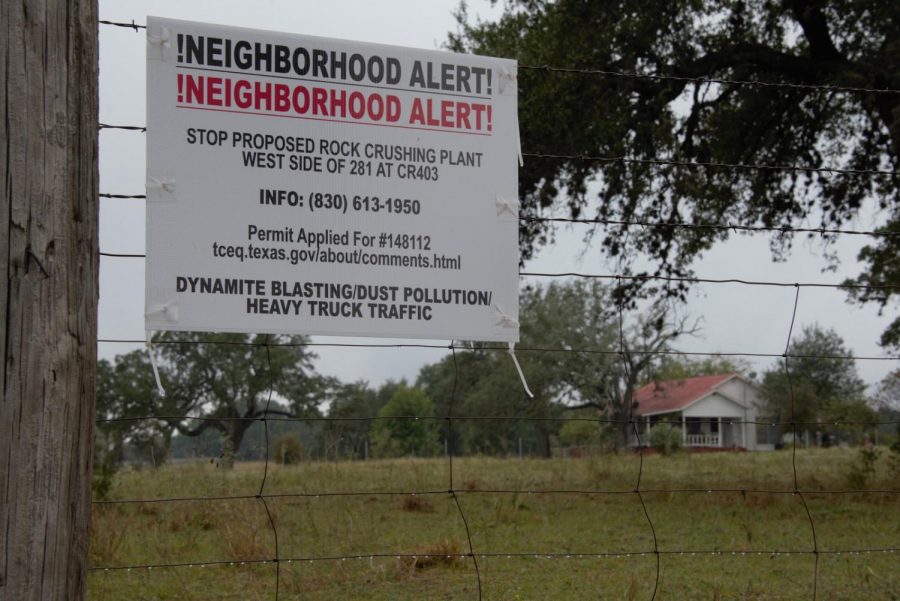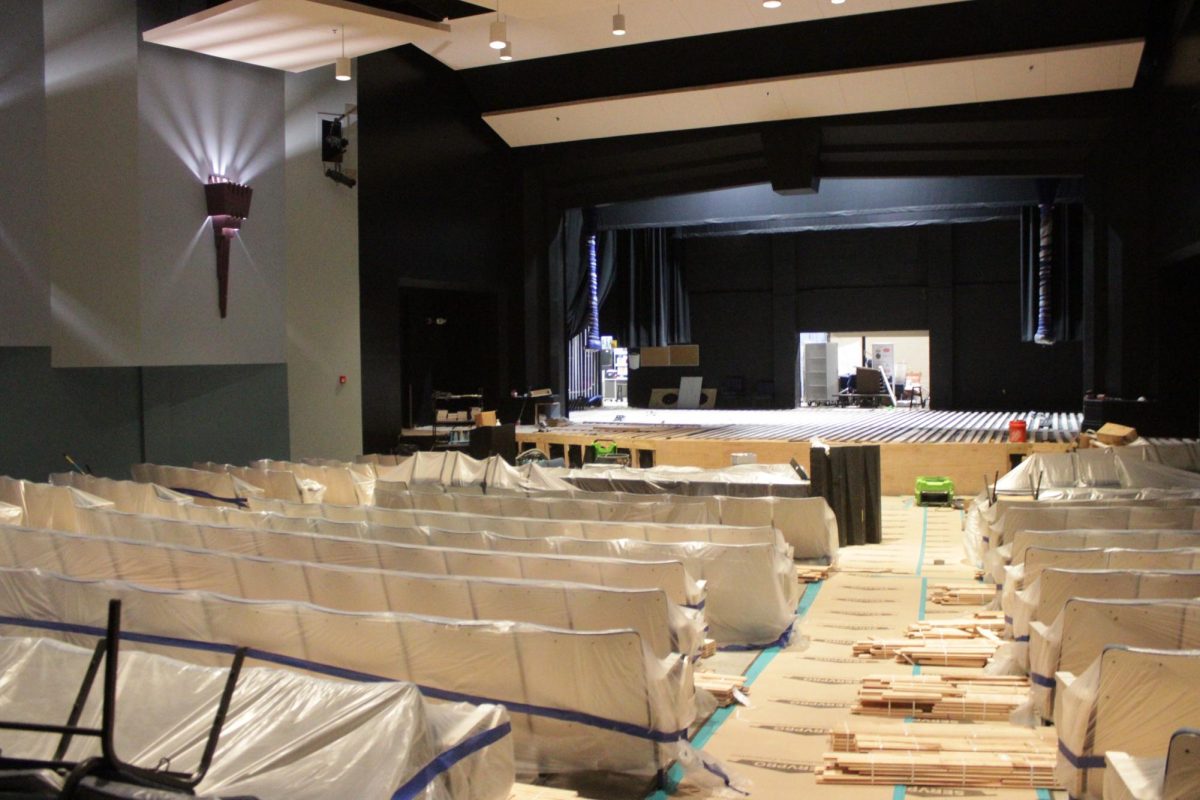Twelve minutes and nine miles from the heart and core of Marble Falls rests the site of Asphalt, Inc.’s proposed limestone quarry. For civic leaders in the three cities, the quarry is too close for comfort, but officials of the asphalt production company in nearby Spicewood say that producing asphalt is critical to providing a comfortable way of living for countless Americans.
The ongoing conflict over the proposed quarry is anything but comfortable.
Marble Falls, Horseshoe Bay and Round Mountain, three cities northwest of Austin, just less than an hour away, fear the possible repercussions of a rock-crushing quarry being built at the edge of their cities’ borders. Dreading more than just an eyesore, the cities worry that their economy, tourism, and city health will all suffer. In fact, the city of Marble Falls was unaware of the threat until September, according to its mayor, John Packer.
“We found out accidentally through someone at Burnet County, who found out through word of mouth,” Packer told The Shield in an email. “There is no requirement in the Texas Commission on Environmental Quality (TCEQ), air quality permit for an applicant to notify the city limits or extraterritorial jurisdiction that they fall in. Our initial reaction was that there must be some way for a city to contest this application, because it will be detrimental to our city. [But] there is no way to contest it.”
There appears to be evidence of prior communication between the commission and the company in documents The Shield acquired from the TCEQ through an open records request.
The documents include the official TCEQ permit and correspondence between Asphalt, Inc. and TCEQ representatives. In an Aug. 22 email, the commission informs Asphalt, Inc., that it is “now required to publish notice of your proposed activity within 30 calendar days. …” Nine days later, The Highlander, a Marble Falls paper, included a small advertisement announcing the planned rock quarry.
The Shield then reached back out to Mayor Packer to ask if he had seen the newspaper ad.
“I’m not sure what article” you are asking about, Packer said before reiterating that “there is no requirement for Asphalt Inc or TCEQ to notify municipalities. … There is a standard air quality permit process set up by the state legislature that is basically an expedited way for a rushing and quarrying operation to get established with virtually no input from the community or neighboring property owners.”
The TCEQ Permit was issued to Asphalt, Inc. at the beginning of December.
The granting of a permit does not mean that construction will begin yet–far from it. The TCEQ permit was only one step in the process of acquiring permission to begin construction. According to Troy Carter, the operations manager of Asphalt, Inc., the company was required to complete and receive around 14 different permits to be allowed to operate its facility. The quarry that Asphalt, Inc., plans to operate is not a short-term project. It’s planned to be a permanent site, and since the application has been approved, both Marble Falls and Asphalt, Inc. will soon be neighbors.
Despite this outcome, city officials in Marble Falls have not stopped fighting. According to a Jan. 4 article on KVUE.com, the city is suing the TCEQ over Asphalt, Inc.’s application. They argue that TCEQ’s permit application for rock quarry plants violate the Clean Air Act and that the TCEQ has not declared whether it is properly adhering to the requirements to evaluate PM2.5 emissions.
Michele Hart, a citizen who has joined her community in fighting the quarry, declined to comment; she described the information as “top secret” as they approached the proceedings.
When Asphalt, Inc., applied for this permit, their chosen area was the same place Marble Falls had planned for residential growth. The city had already built a hospital less than three miles away, Packer said. Marble Falls has dedicated more than $14 million in water and wastewater pipelines to the area for the Baylor Scott & White Regional Hospital and the nearby residential developments. According to data from 2016 on the Marble Falls Economic Development Corporation, the hospital currently employs 400 Marble Falls residents, and the city had hoped that construction of an estimated 700 homes would employ more. After such a substantial investment, the city fears that the proposed quarry would slow or stop these developments.
“For a small town, that’s a large investment,” Packer said. “It will be very difficult to get a return on our taxpayers’ dollars invested if development does not occur in this area.”
According to Hart, Asphalt, Inc. executives argue that their rock quarry will provide 70 jobs for Marble Falls citizens, but residents feel that that number is insignificant compared to the number of jobs that the planned development would have created.
The citizens of Marble Falls say they fear that not only will they lose past investments, but the quarry would prevent further growth and damage the quality of life. The effects range from serious highway safety issues and groundwater overuse issues to poor air quality and issues with stormwater runoff.
Carter, the company’s operations manager, spoke with The Shield in a phone and an email interview. He addressed concerns about the corporation’s planned operation and how they might impact the community. Carter said he has been in the aggregate business, where different materials are bonded together to make concrete, for 19 years, and has run the operations at Asphalt, Inc. for 17 of those.
Their push to construct the quarry was prompted by their asphalt plant just 10 miles away in Spicewood. The Spicewood plant requires materials from a rock quarry, but currently, these materials are supplied by a separate distributor. Carter said the company would like control the supply and the cost of its resources, so the company requested to build in Marble Falls. This quarry would be their fifth.
When asked whether he expected the backlash given from Marble Falls, Carter said he had but that it had been more than he expected.
“I have never been in a situation where our business is welcomed into an area with anything other than opposition,” Carter said. “I truly understand that we are not who folks want to see move in next door.”
He continued, explaining the purposes of rock quarries.
“The products we produce are vital to our way of life,” he said. “Without [them] we would not have paved roads or … concrete floors.”
While the argument may have merit, it hasn’t swayed the opposition in Marble Falls. Community leaders remain against the new quarry. In protest, residents have rallied together to discuss, protest and contact different organizations to both learn more about the quarry plans and put an end to them. They’ve organized into the “Central Texas Clean Air Coalition” and have sent 1,100 messages of protest against the operation, filed electronically through the TCEQ’s website.
Asphalt, Inc., must meet a variety of regulations before the quarry can operate; Marble Falls must approve the company’s plans for stormwater runoff, exposure to waterways and the prevention of endangerment of protected species.
The corporation hosted an informational meeting on Oct. 26, as was required by the TCEQ permitting process. Around 400 people attended, including politicians, residents and representatives from the Baylor Scott & White Hospital. At the meeting, residents asked questions and voiced their concerns regarding the permit and air quality.
Carter also met with the the mayor, city manager and district attorney of Marble Falls.
Many residents said afterward that they were not satisfied by the informational meeting. They took their fight to both the streets and the Internet.
“We have filed comments to the TCEQ regarding deficiencies in the applicant’s information on their permit application,” Packer said. “We are annexing an area which includes the proposed site to possibly have more control on them when [they] do begin operations, met with leaders of Texas Department of Transportation, Senator Buckingham, Representative Terry Wilson, [and will be] meeting at the governor’s office.”
The most noticeable event so far of their fight against Asphalt, Inc. was the on-site protest on Sept. 30, where the many gathered held signs and wore masks over their mouths. The quarry location is five miles from the Baylor Scott and White medical hospital, and many members of the community fear the repercussions of dust from the proposed rock quarry.
This dust is also referred to as Crystalline Silica, which is a main component of soil, sand and other minerals. Its common form is quartz, but in areas of construction and quarrying, the dust is reduced into breathable sized particles, becoming hazardous when released into the air, according to Occupational Safety and Health Administration section of the Department of Labor website.
Rock quarrying is listed by OSHA as one of the jobs and settings that trigger the hazards of the particle. The dangers of inhaling the dust include silicosis–the most common form occurring after 15 to 20 years of low exposure to the particle, with symptoms including chest pain, shortness of breath, and respiratory failure–and an increase in likelihood of lung cancer or tuberculosis.
According to Carter, Asphalt, Inc. is taking precautions to ensure the community isn’t affected by Crystalline Silica.
“I am aware of the concerns raised by Crystalline Silica dust,” he said. “We will follow the guidelines laid out by the Environmental Protection Agency.”
Crystalline Silica is a confirmed human carcinogen by both the World Health Organization’s International Agency for Research on Cancer and the National Institutes of Health’s National Toxicology Program.
Hart, who joined the protesting, says she fears for her community’s health. Hart first learned about the quarry in September while she was in New Mexico; a friend called her and asked if she had heard about the upcoming quarry.
“I had no idea what [she was] talking about. … But I pulled it up, … and as the crow flies, [the rock quarry is] four miles from my house,” Hart said. “My house is on the very first hill that faces the proposed quarry site, and I have lung disease.”
Hart has owned her property for three years but moved in around 18 months ago after construction finished.
“It’ll be one of the first houses that catches debris, but it’s my dream home.” Hart said. “I never planned on moving.”
Hart describes herself as a headstrong and aggressive, but as having a tendency to bow her head and stay uninvolved when it comes to politics. She was inspired to take up arms and campaign against Asphalt, Inc., however, because, in her words, she felt that refusing to exercise the rights to protect her community’s future was unacceptable.
“Any time I held one of those signs and people drove by and honked, I’d start crying,” Hart said. “It was just so moving. I’m holding up this sign to say ‘Save my life, save our future, save our children’s future.’”
Asphalt, Inc. has pushed for rock quarries in other cities as well. Florence, Texas, less than an hour from Marble Falls is a similar fight against a new rock quarry. Laura Colburn, a resident in Florence, has three major concerns: the noise and dust, the toxic fumes, according to OSHA, from asphalt processing, but “probably the biggest issue is water.” Colburn describes. “The quarry is capable of pumping 300 gallons per minute for 10 hours every day. That’s 18,000 gallons per hour and 180,000 gallons every day. They claim they’ll reuse 90 percent of the water they use, but they’re not required to do so and have no way to prove that they are. If they try to pump that much water, wells throughout the area will go dry, costing families who rely on well water thousands of dollars to drill deeper.”
Colburn described that a lack of water is not new to Florence, but she fears a new quarry will aggravate the situation. In 2009 and 2011, wells throughout the city and area ran dry and had to be deepened, which is costly. “There is a limited amount of water available in the Trinity aquifer,” Colburn said. “Eventually, there were will be no way to drill deeper and reach water.”
“Asphalt, Inc. has given no indication that they want to be or will be a good neighbor and a responsible community partner.” Mayor Packer said. “They’ve done this before, and they know how to do it to where they can fly under the radar until it is too late.”









Kristen T. • Jan 23, 2018 at 8:59 pm
I really hope that the community’s voice is heard in this matter- it seems so unfair that their quality of life will go down thanks to this quarry. I understand the company’s argument, but putting people’s health on the line is not acceptable.
Jazzabelle Davishines • Jan 23, 2018 at 11:38 am
It’s sad to see the voices of communities being ignored in favor of businesses.
Ellen Fox • Jan 23, 2018 at 11:24 am
I think that this quarry is a bad idea. Even with listening to both sides of the argument, from the people and from the CEO, I think that this is a horrible decision for Marble Falls. It puts the environment and people’s health at risk, all for a little more concrete and money in the pockets of big companies. If there is a petition I’ll sign!
Janssen Transier • Jan 19, 2018 at 2:43 pm
I like this article because it’s relevance to our communties.
Cole T. • Jan 19, 2018 at 2:23 pm
So basically, people who live here hate it, tourists will hate it, and big business will love it. Well I suppose when big business ultimately do ignore us a do it anyways life won’t get too terrible, just everything will get a little worse, besides our air. Our breathing air will suffer greatly.
Tomas Marrero • Jan 19, 2018 at 2:18 pm
Although the article was interesting and quite well written and thorough, I feel that the subject doesn’t pertain very much to the McCallum student body.
Wyeth Purkiss • Jan 19, 2018 at 1:56 pm
The issue at present has no effect on McCallum students directly. However it was very direct and had a lot of juicy dialogues with many of the people involved in the conflict. It presents multiple perspectives and their are many effective details I enjoyed about that. It is written well and very orderly the article is.